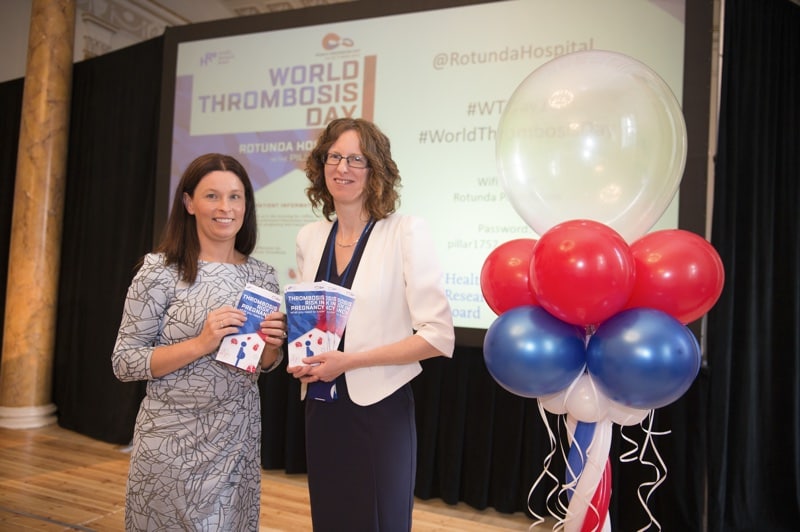New patient information programme launched in Rotunda hospital
to raise awareness of thrombosis in pregnancy

‘Thrombosis Risk in Pregnancy: What You Need to Know’ is a new patient information programme, developed by researchers in the Rotunda and introducing the world-class thrombosis research ongoing in the Rotunda Hospital and its partner institutions.
Venous thromboembolism, or Thrombosis, (clots in the leg or lung) is the top direct cause of maternal death in the UK & Ireland. Our new Patient Information Programme, along with the ongoing research taking place in the hospital, hopes to inform and empower women to understand thrombosis and how we calculate risk, diagnose, treat, manage and prevent cases of VTE in pregnant women.
A patient information leaflet is made available to maternity hospitals around the country – and the printable and web versions are available online for download Patient Information Leaflet: VTE in pregnant women

To launch our new programme and to celebrate World Thrombosis Day 2016, the Rotunda Hospital hosted a Patient Information Morning and Academic Conference on Thursday October 13th.
The aim of the conference was to raise awareness of thrombosis and its risks, both in obstetrics and oncology, and to showcase some of the current Thrombosis research being done around Ireland. Patients, public and healthcare professionals jointly participated to help us cast light on the risks of Thrombosis and to discuss how we can solve these problems in the future.
The morning session of the day featured an informal information session followed by short talks on a variety of topics. Thrombosis Ireland introduced their newly formed patient group. Olive O Connell, the founder of MediStori, delivered a talk inspiring patients to be proactive in managing their own health and the importance of being able to recognise risks, especially when it comes to Thrombosis. Paula Finnegan, a patient who suffered a postpartum deep vein thrombosis was there to talk about her experience and what she learned from it.
During the morning session, the Rotunda Hospital Thrombosis Group presented a demonstration of Thrombocalc, a novel risk assessment tool for VTE that has been developed in the Hospital. We hope it provides an insight for patients about how VTE risk is assessed and managed in the hospital. Strikingly, most women who died from pregnancy-associated VTE between 2011 and 2013 in the UK and Ireland had recognizable risk factors for thromboembolism. Many of these deaths may have been prevented if VTE risk assessment had been performed and appropriate anticoagulation prescribed. Thrombocalc ensures all women delivering within the Rotunda Hospital are appropriately assessed for VTE risk and thereby improve the prevention of VTE in these women. Dr Jen Donnelly demonstrated how the tool was developed and implemented in a presentation in the Academic Conference in the afternoon.
Some of the other ground breaking thrombosis research presented in the afternoon includes Dr Feras Abu Saadeh and Dr Kevin Ryan from St James Hospital, who explored some unanswered questions about cancer, including gynaecological cancer, and its associated thrombosis. Dr Fionnuala Ni Ainle, Consultant Haematologist at the Rotunda Hospital and Mater Misericordiae University Hospital, and author of our Patient Information Programme, gave an overview of the Rotunda Hospital’s thrombosis and pregnancy research – the questions we’re asking and the answers we’re finding.
Dr. Fionnuala Ni Ainle, Author of the new Patient Information Programme and Chair of the Conference said;
“I would encourage every woman who is pregnant or thinking about pregnancy, and her family, to know about blood clot risk. We look forward to meeting as many of our mums and their families as possible on World Thrombosis day”
Prof. Fergal Malone, Master, Rotunda Hospital said;
”Thrombocalc is yet another example of how internationally ground-breaking research, conducted at the Rotunda, is being translated into effective changes in antenatal and postnatal care, with a view towards further reducing the terrible complications associated with thrombosis. Our next step is to ensure that all pregnant women in Ireland are aware of the risks associated with thrombosis and to ask their healthcare providers about individually risk assessment techniques.”
For more information, please contact Cormac McAdam at cormacmcadam@rcsi.ie or 00353 87 232 9101
www.rotunda.ie
www.worldthrombosisday.org
@RotundaHospital
#RotundaResearch
About The Rotunda Hospital
In 1745 Bartholomew Mosse founded the original Dublin Lying-In Hospital as a maternity training hospital in George’s Lane. The hospital was a unique institution in that it was the first of its kind. The hospital moved to its current premises on Parnell Square in 1757 where it became the “The New Lying in Hospital”. Today, the hospital is simply known as “The Rotunda” and remains an independent, voluntary organisation operating under Charter with an independent Board of Governors and executive management team led by the Master of the Rotunda. The ethos and core values of its founder are still at the heart of the hospital and this is demonstrated through the care and dedication of the staff and the Board of Governors of the Hospital. Over time the hospital has evolved into a 198 bed teaching hospital which provides specialist services in order to support women and their families at a local, regional and national level.
Specialist Services at The Rotunda Hospital include advanced fetal diagnosis and therapy, minimally invasive gynaecologic surgery, neonatology, colposcopy, community midwifery services, and the Sexual Assault Treatment Unit.
The specialist services provided by The Rotunda Hospital are fully supported by a range of subspecialist services such as Anaesthetics, Haematology, Radiology, Psychiatry, and Allied Health Services within the Hospital and joint services such as Cardiology, Endocrinology, Gastroenterology, Infectious Diseases with acute adult hospitals.
About World Thrombosis Day
Recognized on 13 October, World Thrombosis Day (WTD) focuses attention on the often overlooked and misunderstood condition of thrombosis. With thousands of educational events in countries around the world, WTD and its partners place a global spotlight on thrombosis as an urgent and growing health problem.
WTD takes place every year on 13 October, the birthday of Rudolf Virchow who was a pioneer in the pathophysiology of thrombosis. A German physician, pathologist, biologist and anthropologist, Virchow developed the concept of “thrombosis” and advanced our understanding of this condition.
WTD seeks to increase global awareness of thrombosis, including its causes, risk factors, signs/symptoms and evidence-based prevention and treatment. Ultimately, WTD strives to reduce death and disability caused by the condition.
The WTD mission supports the World Health Assembly’s global target of reducing premature deaths by non-communicable disease by 25 percent by 2025, as well as the World Health Organization’s global action plan for the prevention and control of non-communicable diseases between 2013 and 2020.


